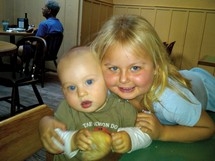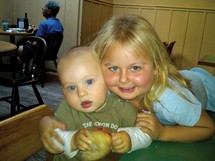
DOWNTOWN — It’s something that no parent is ever prepared for.
Sarretta McDonough thought that her 3-year-old daughter Lauren just had a cold, but she wasn’t getting over it, and her symptoms seemed a little strange. Her eyes were puffy, and her stomach seemed distended.
McDonough took Lauren to the family doctor, not certain what she was going to hear.
“Our doctor realized immediately that she was retaining water and found that she was dropping protein,” McDonough said. Lauren went in for blood testing.
“At first, they thought all she had was minimal change disease, which tends to resolve itself early on,” McDonough said.
Minimal change disease is a kidney disorder in which damage occurs to nephrons, units that filter blood and produce urine.
Minimal change disease rarely causes kidney failure, and can be countered with corticosteroid treatments, which Lauren was quickly put on.
But Lauren relapsed, and doctors recommended a biopsy.
“It became clear that this was not going to be something that was easy to manage,” McDonough said. “It was serious.”
The biopsy revealed that Lauren had deposits on her kidneys. The minimal change disease had developed into focal segmental glomerulosclerosis (FSGS), a remarkably rare disease that attacks the kidney’s filtering system and causes scarring.
FSGS also causes a loss of protein to the blood, a condition known as nephrotic syndrome. There is no approved treatment, and no known cure.
McDonough considers the day the doctor phoned her with the news the worst day of her life.
“She was my only child, 3 years old at the time,” McDonough said.
“It was extremely scary.”
McDonough went online, seeking support and other people who were going through the same things she and her daughter were going through.
“That’s when I came across NephCure,” she said.
The NephCure Foundation is a Pennsylvania-based organization that funds research and education about FSGS and nephrotic syndrome.
“It’s the only organization devoted to FSGS and nephrotic syndrome,” McDonough said. “It gave me a sense that there were other people going through this, that I wasn’t alone.”
McDonough swiftly became an advocate for NephCure’s research and education programs, and within a year, she was a volunteer member of NephCure’s board of directors, on the foundation’s research committee.
“People like Sarretta are vital to the growth of an organization that deals with a rare disease,” said Henry Brehm, executive director of NephCure.
McDonough’s experiences as a parent give her an understanding of the disease that is different than a doctor’s, but just as important, he said.
“She’s a passionate volunteer, and that comes with dealing with the issue every day with her child,” Brehm said.
“None of us who have healthy kids can say that we know what that’s like,” he added.
And understanding is what is especially important with a rare disease.
“Families need to be educated. Many of the doctors need to be educated because they haven’t seen it before,” Brehm said.
Education and research are what’s motivating NephCure’s Advocacy Day.
On Oct. 5, families that have been affected by FSGS and nephrotic syndrome will visit Washington, D.C. to demonstrate to Congressional members the importance of funding for research of those rare diseases, Brehm said.
Collectively, there will be about 100 meetings between families and their respective representatives, he said.
McDonough will be there, representing her daughter.
Visibility is key, McDonough stressed.
“All we want is to bring awareness to D.C.,” she said.
Brehm said that despite an excellent reception from the medical community, the rarity of the disease often means that government funds are allocated towards more publicized diseases that affect a wider range of people.
“We’re the only organization in the country, this is our mission, but with that comes the rarity,” Brehm said.
“Hopefully, with all the meetings we’re going to have over the next week, some sense of urgency will be passed on,” he added.
Along with Advocacy Day, NephCure provides educational seminars and fundraising events across the country.
McDonough is preparing for a fundraising walk at the Annenberg Beach House on Nov. 19, which will feature nephrologists from Cedars-Sinai Medical Center, UCLA and Children’s Hospital Los Angeles as guest speakers.
Lauren is 5 now and she has a birthday coming up this month. She attends Franklin Elementary, where her favorite activities are math and soccer.
“We’ve been able to manage the condition, and we want her to have a normal childhood,” McDonough said. “Have friends, do ballet, play sports.”
Even though they make accommodations to prevent a relapse, Lauren and her family are not controlled by FSGS, McDonough said.
“We try and make sure a lot of water is purified, we try and make sure we reduce any exposure to sickness,” she said.
“We’ve tried to make it seem as if it’s part of our lives, but it’s not the part that controls anything. It’s just something we deal with.”
news@www.smdp.com








